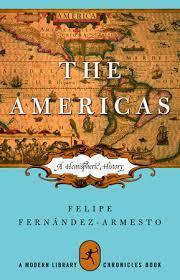From what I can tell from Felipe Fernández-Armesto’s Goodreads biography and résumé, the man is half journalist and half historian. Perhaps, that’s why I enjoyed his writing. He’s perhaps a better journalist than any writing for the papers these days (always pointing out his own biases rather than writing opinion pieces as fact) and keeps his research assignments to the point instead of meandering in and out of his feelings (which I’ve noticed modern-day scholars doing a lot of lately). I could be wrong about him as a whole, he has a rather lengthy list of books and I have only read two of them. But what I have read, I have loved.

The Americas: A Hemispheric History has an average star rating of 3.25 on Goodreads. I gave it 5 stars. Most of the complaints seem to be that he’s not a specialist in his field and wrote too general a book––which I found incredible that he took so much history and covered it so well in two hundred pages––or, that he used words and language people didn’t understand (apparently, if you’re a journalist, you’re doomed to two syllable words forever?). The book did tackle a very broad scope of history and condensed it to a cozy mystery length, but the fact that he did it without missing major broad strokes, still telling the stories of the North and South Americas without skipping things your average high school student should know about this hemisphere but rarely does… I found it impressive.
By no stretch of the imagination is The Americas an end all be all. It is a jumping off point for people who love to learn. It’s a book that identifies all the major players textbooks are required to mention, and a few they fail to, during the times of exploration and conquest. He poses a few philosophical questions about viewpoints so you know when there is a conflict of perspective so you can go forth and research from there. There are many things Fernández-Armesto says that I don’t entirely agree with, but I liked that he made his biases clear and actually referred to them as biases. I would much rather read differing viewpoints and discuss topics outside of an echo chamber than not, but I also greatly appreciate when people are able to step back and say, this is my bias rather than infer that anything coming from their mouth (or pen) is a universal truth simply because that’s how they feel.
For instance, for a historian, Fernández-Armesto seemed to articulate a very laid back view of how all history is just a matter of perspective, not fact. This made for great storytelling, as he presents all sides of a situation, but as a Christian and self-taught scholar, I do believe in the existence of universal truths. I believe modern society as a misguided view on which things are universal truths/ facts and which are not due to the hot button phrase “my truth.” I tell my kiddo, having empathy for someone’s perspective, understanding where they are coming from and how they got the ideas they have, does not make their ideas correct. Those who do not know history are doomed to repeat it, and those who do are doomed to watch everyone else repeat it, but I’d still rather go through the world with my eyes wide opened. I still want to go through the world with an ear that hears.
Maybe that’s why I find Fernández-Armesto’s writing style approachable and easy, when others have not. He doesn’t say all the politically correct things. He doesn’t perpetuate the required narrative, but shares the facts he has collected along with his own ideas (and is very clear about what are ideas). I pick his books up when I’m starting an in-depth study as an armchair book to whet my appetite for the topic. I’d recommend this particular one as a pre-requisite title before diving into source documents. I ordered a couple books he cited as I was reading, and even more as I read his bibliographical essay at the end of the book. I love that style of works cited. Is it a professional format used by scholars? No. Is it fantastic for a people in their homes wanting to know what books the author read to come to the conclusions he did? Yes. And honestly, how often do you get a chance to read someone’s bibliography for pleasure?
I’m excited, as always, to know more today than I did yesterday… and more tomorrow than today. I’m excited, as always, to find out all the things I don’t know, and learn them––only, of course, to find I don’t know even more things. I think this is why I “eat history for breakfast,” as a friend of mine once said, because I’m a detective always on the hunt for information, so I can understand the world God made a little better.
